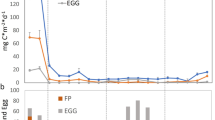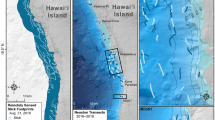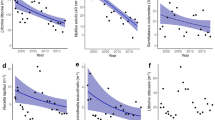Abstract
IT has been a favourite idea with marine biologists in recent years that a connexion exists between the amount and timely efflorescence of plankton algæ and the success of propagation of certain sea fishes, the fry of which are directly or indirectly dependent upon the plankton algæ for their food. The correctness of this view has been demonstrated at least as regards the mackerel on the south coast of England by Prof. E. J. Allen, who traces the ultimate cause of the algal growth back to more or less abundant sunshine in the first months of the year. Prof. Gran has also shown that another influence must be at work to produce conditions more or less suitable for the development of plankton algæ, namely, the more or less plentiful amount of fresh water flowing into the sea and carrying with it from the land the salts and other substances necessary for plant life in the sea.
This is a preview of subscription content, access via your institution
Access options
Subscribe to this journal
Receive 51 print issues and online access
$199.00 per year
only $3.90 per issue
Buy this article
- Purchase on Springer Link
- Instant access to full article PDF
Prices may be subject to local taxes which are calculated during checkout
Similar content being viewed by others
Author information
Authors and Affiliations
Rights and permissions
About this article
Cite this article
SUND, O. Snow and the Survival of Cod Fry. Nature 113, 163–164 (1924). https://doi.org/10.1038/113163c0
Issue Date:
DOI: https://doi.org/10.1038/113163c0
Comments
By submitting a comment you agree to abide by our Terms and Community Guidelines. If you find something abusive or that does not comply with our terms or guidelines please flag it as inappropriate.



